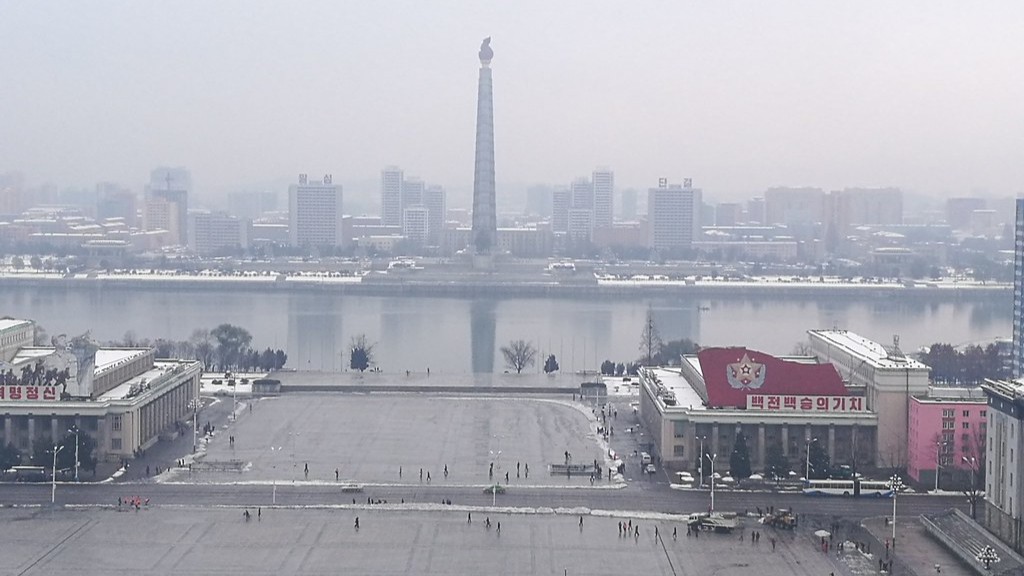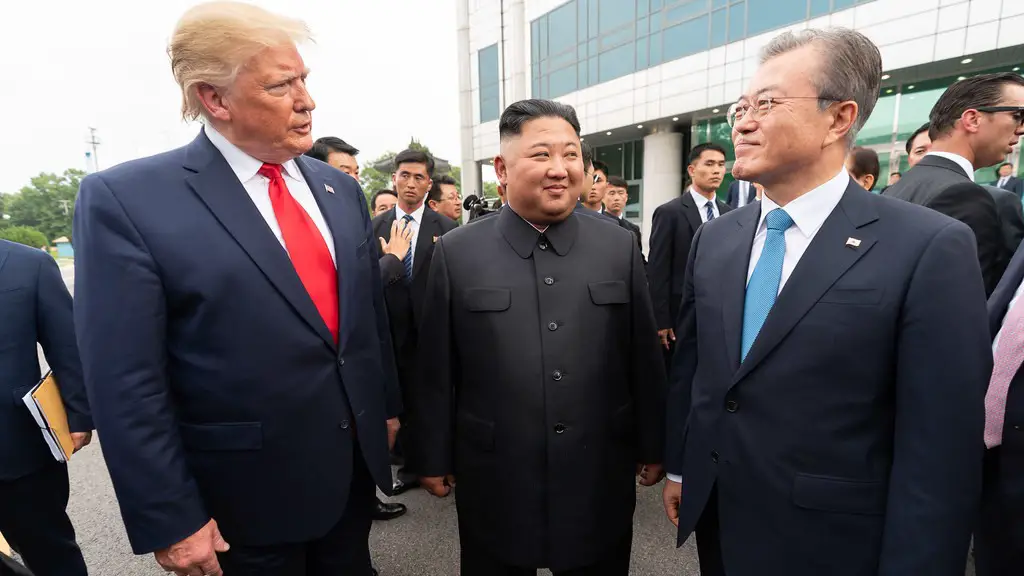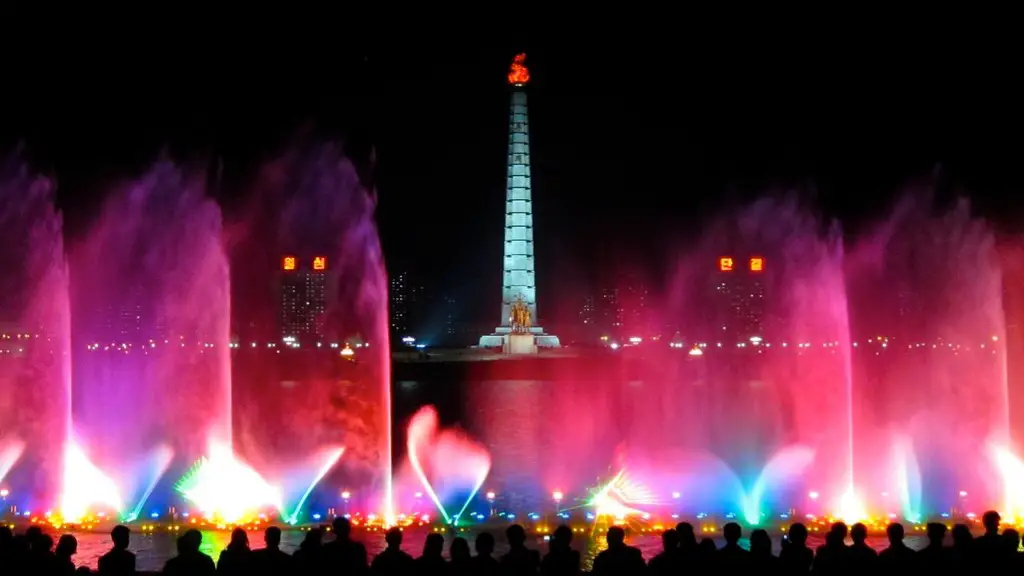Introduction
North Korea has been an authoritarian regime since 1948. The nation has been ruled by the same family, Kim Il-sung, Kim Jong-il, and Kim Jong-un, for the last century. North Korea remains one of the world’s most highly militarized states and one of the most oppressive dictatorships. North Korea’s repressive government continues to be subject to intense international criticism and scrutiny. This article provides an overview of the country’s authoritarianism, including North Korea’s history and the political and social forces that enabled its modern-day oppressive rule. It further explores the impact of authoritarianism on North Korea’s people, economy, and international relations.
History of Authoritarianism in North Korea
North Korea has been under authoritarian rule since its formation in 1948. Kim Il-sung, founder of the nation, declared himself the leader and began instituting a series of oppressive measures that extended throughout his rule and beyond. His son and successor, Kim Jong-il, continued these policies and further consolidated the regime’s power. Upon Kim Jong-il’s death in 2011, his son Kim Jong-un assumed control of the country and has since increased the regime’s powerful grip.
Kim Il-sung and his successors used a variety of tactics to ensure their own power and maintain control of the population. This included the creation of a cult of personality and loyalty oaths, restrictive press and internet access, surveillance, and punishing politically-motivated human rights violations. North Korea has also maintained a large military presence and conducted extensive military drills. In addition, North Korea’s government has been known to sabotage its own people’s efforts to escape the country via its borders that are defended by heavily fortified borders.
Effects of North Korea’s Authoritarianism
The authoritarian regime in North Korea has had numerous effects on the country and its people. The regime has caused extreme poverty and deprivation, with the majority of the population unable to afford basic necessities such as food and medical care. The restrictions on freedom of movement and communication have also had a negative impact, with millions of North Koreans lacking access to information and resources from the outside world.
North Korea’s authoritarianism has also had a significant impact on its economy. Economic sanctions, along with the country’s refusal to open its markets to the outside world, have caused the nation’s economy to stagnate. The country’s economic crisis has been exacerbated by the government’s refusal to engage in international trade, which has further suppressed the country’s economy.
International Repercussions of North Korea’s Authoritarianism
North Korea’s authoritarian regime has also had far-reaching repercussions in the international community. The country’s aggressive rhetoric, nuclear development, and provocative military exercises have raised tensions with the United States and other countries. North Korea’s nuclear weapons program has resulted in multiple rounds of UN sanctions, which have further weakened and isolated the nation.
In addition, North Korea’s authoritarian regime has resulted in extensive human rights violations. The country has been strongly criticized by the international community for its harsh treatment of political dissidents and its refusal to provide access to humanitarian aid. The regime has also been harshly criticized for its abuse of prisoners and its use of forced labor.
The Role of the International Community
The international community has made various attempts to address the human rights issues stemming from North Korea’s authoritarian regime. The United Nations has adopted several resolutions and declarations condemning the country’s human rights abuses. The United States has also been a major critic of North Korea’s authoritarianism and has imposed multiple layers of economic sanctions on the country. Other countries, such as China and South Korea, have also sought to pressure North Korea to end its oppressive policies and open itself to the international community.
Despite these efforts, however, North Korea’s authoritarianism remains largely intact. The regime’s grip on power appears to be largely unshakeable and the country continues to limit media access and freedom of movement for its citizens. In addition, North Korea’s anti-international sentiment and its hostile posture towards the United States and its allies show no signs of abating.
Can Anything be Done to Change North Korea’s Authoritarianism?
Although North Korea’s authoritarianism remains largely unchanged, there have been some signs that the regime could be open to reforms. In 2018, North Korea made a dramatic shift in its rhetoric when it opened up to direct talks with South Korea and, more recently, with the United States. The country has also made efforts to improve its human rights record, releasing some political prisoners and declaring an end to its public executions.
However, despite these positive steps, there is still much that needs to be done to address the country’s authoritarianism. Experts recommend that North Korea continue to engage in direct talks with the United States and other countries to ease tensions and reduce the risk of conflict. It is also important that North Korea continue to provide access to humanitarian aid to its citizens and ensure that their basic human rights are respected.
The Impact of Sanctions on North Korea
North Korea has been subject to numerous economic and political sanctions from the international community. These sanctions have had a significant impact on the country, most notably on its economy. Economic sanctions have severely limited the country’s ability to trade with other countries and have contributed to the economic stagnation that North Korea is currently facing.
In addition to the economic impacts, these sanctions have also had a political impact. Sanctions have isolated North Korea from the international community, making it much harder for the country to engage in diplomacy and negotiate better terms. Sanctions have also increased pressure on the regime, which has led to the country taking a more aggressive stance towards the international community in an effort to defend itself.
The Impact of North Korea’s Authoritarianism on its People
One of the most devastating effects of North Korea’s authoritarianism is the impact it has had on its citizens. The oppressive regime has resulted in numerous human rights violations, making life in North Korea extremely difficult for its citizens. Many have fled the country in search of a better life, but have been unable to escape the oppressive regime. In addition, North Korea’s regime has severely restricted access to education, healthcare, and basic human rights, such as freedom of speech, assembly, and press.
The effects of North Korea’s authoritarianism can also be seen in the wider society. The regime’s strict censorship and fearmongering tactics have created a climate of terror in which citizens feel unsafe to speak out against the regime. In this climate, dissent is not tolerated and citizens feel powerless to effect change in their country.
The Possibility of Change
Despite North Korea’s oppressive regime and its detrimental impact on its population, there is reason to believe that change is possible. Many experts point to the recent diplomatic rapprochement between North Korea and South Korea as evidence that the regime is beginning to open up to the world. In addition, there have been reports of increased political and economic liberalization in the country, suggesting that the regime recognizes the need for change.
It is clear that North Korea’s authoritarianism will not be easily reversed, but these developments offer hope that change is possible. The international community can help to promote change in North Korea by continuing to apply pressure on the regime, providing humanitarian aid to its citizens, and maintaining diplomatic relations with the country. With the right approach, it is possible that North Korea can become a more open and democratic society.


